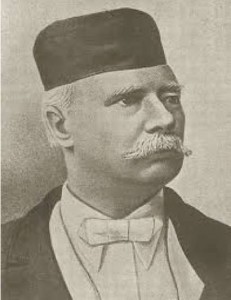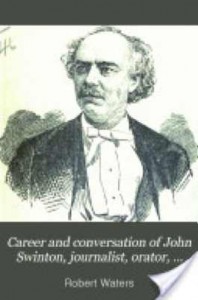by Tarquin O’Flaherty
 John Swinton, born in Scotland in 1829, emigrated to the US with his parents in the 1830’s. Within a few years Swinton’s father had died and the young man became the breadwinner. Thus began a peripatetic existence which began as an apprentice printer in Illinois at the age of thirteen, then he moved to Canada as a journeyman printer until about 1850. He spent the next five years in Massachusetts, from thence to New York City and from there to Kansas where he became manager of ‘The Lawrence Republican’, an anti slavery newspaper. He then moved to the slave state of South Carolina where he secretly taught literacy to black people! By 1860 Swinton was back in New York where, on the strength of work submitted, was offered a post as an editorial writer with the New York Times. Eventually he became the Times chief editorial writer.
John Swinton, born in Scotland in 1829, emigrated to the US with his parents in the 1830’s. Within a few years Swinton’s father had died and the young man became the breadwinner. Thus began a peripatetic existence which began as an apprentice printer in Illinois at the age of thirteen, then he moved to Canada as a journeyman printer until about 1850. He spent the next five years in Massachusetts, from thence to New York City and from there to Kansas where he became manager of ‘The Lawrence Republican’, an anti slavery newspaper. He then moved to the slave state of South Carolina where he secretly taught literacy to black people! By 1860 Swinton was back in New York where, on the strength of work submitted, was offered a post as an editorial writer with the New York Times. Eventually he became the Times chief editorial writer.
Having worked with various New York newspapers, the Times, the Sun and the Tribune, John Swinton founded his own paper in 1883 which he called simply ‘The John Swinton Paper.’ The masthead of his paper pledged amongst other things to uphold the rights of workers and their unions during a time when scab labour and strike breaking by police was an everyday occurrence.
The paper also pledged to warn the American people ‘against the treasonable and crushing schemes of millionaires, monopolists and plutocrats.’ People like Wiliam H. Vanderbilt and Jay Gould were prime targets for Swinton, whom he described as ‘robber barons’.
Refusing all offers of financial assistance during its four years or so of existence, Swinton instead ploughed his own money back into his paper. Swinton’s absolute insistence on total editorial independence and his refusal to accept financial support from any quarter, made him dependent entirely on newspaper sales.
Despite huge support from workers who regularly bought his paper, he simply didn’t sell enough papers to make the whole enterprise viable. In 1887 he was forced through debt to close his paper down. and go back to work at the New York Sun.
Swinton gathered vast crowds when he spoke at public meetings in support of exploited workers. He was a hugely eloquent and passionate speaker and police were called in many times to break up the crowds who came to hear him. His eloquence eventually resulted in his running (unsuccessfully) as a candidate for mayor of New York.
Swinton, died and is buried in Brooklyn, New York where a monument to his memory was erected by union members.
Here is an extract from ‘Labor’s Untold Story’ by Boyer and Morais, concerning a dinner given in Swinton’s honour in 1880 by his fellow journalists and ‘leaders of his craft’, at which someone was rash enough to stand and offer a toast ‘to our independent press’.
‘Swinton outraged his colleagues by replying:
“There is no such thing, at this date in the world’s history, in America, as an independent press. You know it and I know it.
There’s not one of you who dares to write your honest opinion, and if you did you know beforehand that it would never appear in print. I am paid weekly for keeping my honest opinion out of the paper I am connected with. Others of you are paid similar salaries for similar things and any of you who would be so foolish as to write honest opinions would be out on the street looking for another job. If I allowed my honest opinion to appear in just one issue of my paper, before twenty four hours my occupation would be gone.
The business of the journalist is to destroy the truth, to lie outright, to pervert, to vilify, to fawn at the feet of mammon, and to sell his country and his race for his daily bread. You know it and I know it and what folly is this toasting an independent press?.
We are the tools and vassals of rich men behind the scenes. We are the jumping jacks; they pull the strings and we dance. Our talents, our possibilities and our lives are all the property of other men. We are intellectual prostitutes.’
END OF QUOTE.
 What an amazing character this man was and how right he was about the realities of the journalistic profession. Today precisely the same carpet baggers and swindlers, the same insatiable greed is everywhere and exploitation is rampant.
What an amazing character this man was and how right he was about the realities of the journalistic profession. Today precisely the same carpet baggers and swindlers, the same insatiable greed is everywhere and exploitation is rampant.
However, despite this, we do nowadays have campaigning journalists, newspapers and the public broadcasting services who fight valiantly against ridiculous odds to expose some of the worst excesses of the system. That these honourable people occasionally succeed in sending some of these swindlers to jail deserves our unstinting admiration.
That these campaigners exist at all, or are allowed to exist and continue campaigning, gives me hope that all the things that John Swinton held dear, like honesty, self-respect and the care of the down trodden have not been entirely lost to the world.
Tarquin O’Flaherty
